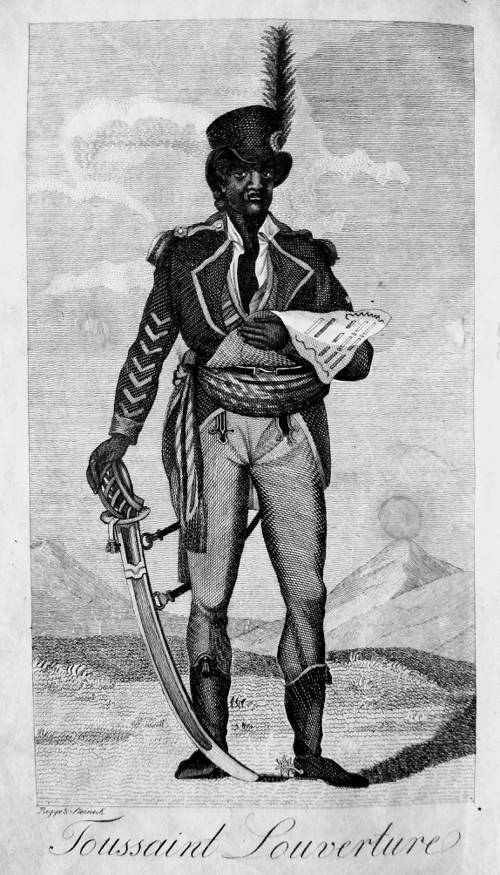
FAQ About Francois-Dominique Toussaint Louverture

Who was Toussaint Louverture?
Toussaint Louverture was a prominent leader in the Haitian Revolution, which was instrumental in the abolition of slavery in Haiti. Born into slavery in 1743 in Saint-Domingue (modern Haiti), he rose to become a key figure in the fight for independence from French colonial rule, eventually leading to Haiti becoming the first free black republic in the world.

What role did Toussaint Louverture play in the Haitian Revolution?
As a central figure in the Haitian Revolution, Toussaint Louverture served as a skilled military strategist and leader. He organized enslaved and free black people and worked with both Spanish and French forces at different times to secure the abolition of slavery. Louverture's leadership was pivotal in turning the tide of the revolution in favor of the enslaved population, ultimately leading to Haiti's independence.

How did Toussaint Louverture contribute to the abolition of slavery in Haiti?
Toussaint Louverture's contribution to the abolition of slavery in Haiti was multi-faceted. He forged significant alliances and demonstrated exceptional military prowess which helped turn the Haitian Revolution into a successful campaign against French colonial forces. Moreover, Louverture enacted policies that aimed to end racial inequalities and secured French recognition for the abolition of slavery in the colony.

What was Toussaint Louverture's early life like?
Toussaint Louverture was born into slavery around 1743 on the Bréda plantation in the French colony of Saint-Domingue. Despite his status, he learned to read and write and was well-versed in Enlightenment philosophy. Louverture gained a reputation for his intelligence and eventually secured a degree of freedom from enslavement, which enabled him to manage labor on the plantation and build connections that later fueled his revolutionary activities.

How did Toussaint Louverture rise to power?
Toussaint Louverture's rise to power was a result of his strategic alliances, military expertise, and charismatic leadership during the Haitian Revolution. Initially joining the insurrection in 1791, he quickly distinguished himself, gaining the support of local and international allies. Louverture’s political acumen and efforts to stabilize the region by forming alliances with European powers further solidified his leadership position.

What were some of Toussaint Louverture's achievements?
Toussaint Louverture's achievements include leading the successful Haitian Revolution, which resulted in the first abolition of slavery in the Americas. He established a prototypical government, introduced economic reforms to stabilize production, and helped embed legal equality for the formerly enslaved population. Louverture’s efforts laid the groundwork for Haiti’s eventual independence and the end of colonial rule.

Did Toussaint Louverture have any impact outside of Haiti?
Yes, Toussaint Louverture had a significant impact beyond Haiti. His leadership in the Haitian Revolution inspired enslaved and free black populations in the Caribbean and the Americas, leading to fears among slave-owning societies about similar uprisings. Louverture's success demonstrated the possibility of a successful slave revolution, influencing abolitionist movements worldwide.

What was the nature of Toussaint Louverture's leadership style?
Toussaint Louverture is remembered for his charismatic and strategic leadership style. He was known for his diplomatic skills, which allowed him to form key alliances, and his ability to motivate and organize both soldiers and civilians. His leadership combined military tactics with shrewd political maneuvering to strengthen the revolution's cause and achieve his goals of abolition and independence.

How did Toussaint Louverture die?
Toussaint Louverture died in 1803 after being captured and deported to France by Napoleonic forces. He was imprisoned at the Fort de Joux in the Jura Mountains, where he succumbed to pneumonia and neglected conditions in captivity. Louverture's death came shortly before Haiti's full victory in the revolution, which led to its independence.

What were Toussaint Louverture's views on slavery?
Toussaint Louverture was firmly against slavery, dedicating his life to the fight against the institution in Saint-Domingue. His actions during the revolution were driven by a commitment to abolishing slavery and ensuring equality and freedom for all people, reflecting Enlightenment ideals of liberty and human rights.

What is Toussaint Louverture’s legacy today?
Toussaint Louverture's legacy today is one of resilience and freedom. He is celebrated as a national hero in Haiti and as a symbol of the fight against colonialism and slavery. His life and leadership have been a source of inspiration for civil rights movements and have emphasized the importance of freedom and justice worldwide.

Did Toussaint Louverture have connections with other revolutionary leaders of his time?
Toussaint Louverture had various connections with other revolutionary figures of his time through alliances and diplomacy. For example, he allied with Spanish and French forces at different points to gain strategic advantages. Louverture's revolutionary diplomacy helped to create a broad coalition against colonial powers, reflecting the interconnected nature of struggles for independence and abolition during that period.

How is Toussaint Louverture remembered in Haitian culture?
In Haitian culture, Toussaint Louverture is revered as a foundational figure in the nation’s history. His leadership and vision are celebrated in annual commemorations and through cultural expressions such as literature, music, and art. Louverture is regarded as a symbol of national pride and resilience in the face of oppression.

What influenced Toussaint Louverture’s political and revolutionary ideas?
Toussaint Louverture was influenced by Enlightenment thinkers and the broader context of revolutionary ideas spreading across the Atlantic world. His adept political strategies were also shaped by his interactions with European political systems and his lived experiences as a person of African descent under colonial rule. These influences informed his commitment to liberty and justice.

Did Toussaint Louverture write any important documents or texts?
Yes, Toussaint Louverture authored several important proclamations and letters that outlined his vision for Saint-Domingue's future, the abolition of slavery, and governance. These documents were crucial in mobilizing support and detailing the revolutionary agenda to both the local population and international observers.

What challenges did Toussaint Louverture face during his leadership?
During his leadership, Toussaint Louverture faced numerous challenges including resistance from colonial powers, internal divisions within Haiti, economic hardships, and military threats. Additionally, he had to navigate complex strategic alliances and the challenges of building a stable post-colonial society while ensuring that slavery remained abolished.

Why did France arrest Toussaint Louverture?
France arrested Toussaint Louverture due to his increasing power and independence as governor of Saint-Domingue. Fearing that his actions threatened French influence and control over the colony, particularly in light of emerging plans to restore slavery, Napoleon Bonaparte ordered his capture as part of a broader campaign to reassert French authority in the region.

How did Toussaint Louverture's actions affect the course of world history?
Toussaint Louverture's actions had a profound effect on world history by directly influencing the abolition of slavery in the French colonies and inspiring similar movements across the world. His leadership contributed to the establishment of Haiti as a beacon of freedom and has historically challenged perceptions of colonial and racial oppression, encouraging subsequent struggles for civil rights and decolonization.

What was the outcome of the Haitian Revolution led by Toussaint Louverture?
The Haitian Revolution, led by Toussaint Louverture and others, resulted in the successful overthrow of French colonial control and the establishment of Haiti as an independent nation in 1804. This revolutionary triumph marked the first instance of a slave-led state gaining independence and set a precedent for global movements toward freedom and self-governance.

What was the significance of Toussaint Louverture's leadership in the context of racial equality?
Toussaint Louverture's leadership was significant in advancing racial equality by challenging the entrenched system of racial oppression and proving that people of African descent were capable of self-governance and leadership. His policies and vision expanded notions of equality and justice, influencing future generations to continue the struggle against racial discrimination and for human rights.
